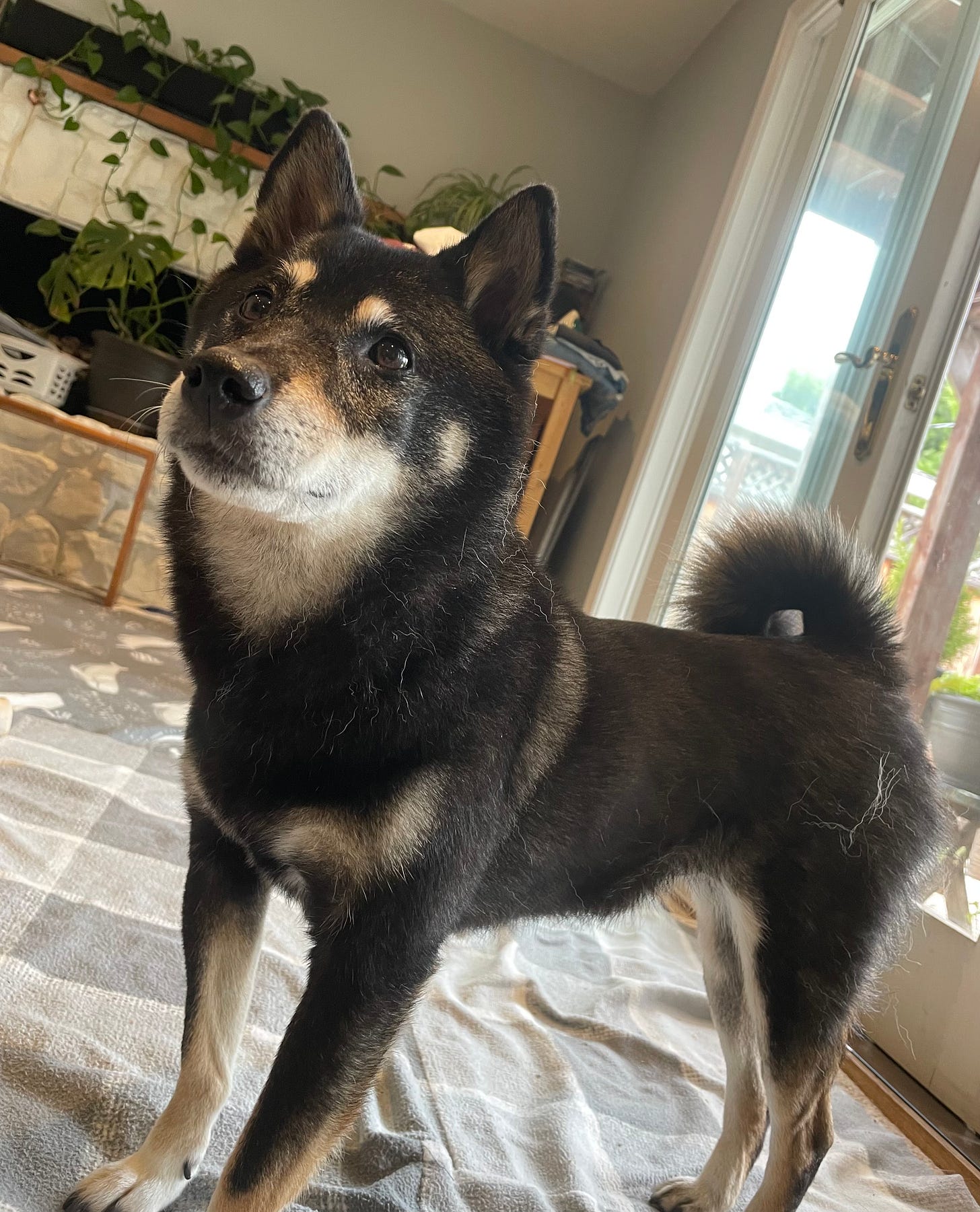If Only My Partner Would Change, I Could Be Happy
Making our well-being dependent on our partner is common—and crazy
Preface: My partner read and agreed to this essay, but she worries you will think she is lazy.
Dear Friend,
For years, I've been battling my partner.
Why does she stay up until 3 a.m.? Why does she dump everything—dishes, compost and garbage—in the sink? Why does she leave her shoes right in front of the door?
I've variously resisted, sometimes internally, other times externally, the un-started bathroom project there for six months, the dust buster on the kitchen floor precisely where it sucked up the mess, the forever missing spray bottle to control the dogs, the clothes on the bed "If I put them away, they'll make the other clothes dirty," ongoing misunderstandings due to her guessing what I said rather than asking, dog poop bags (clean ones) in the "spiritual" brass bowl from Tibet, saying "My bed" when technically it's mine, the never-ending parade of stuff splayed across the kitchen counter/dining table, confusion from her choice of descriptors "It's in a medium-sized rectangular box in the garage." "You mean the hot pink box?" Sometimes, I joke that if she weren't so beautiful, I wouldn't put up with her crap.
But the days she lies on the sofa for hours with the dogs stress me more than anything.
The fence is leaning like a palm tree in a hurricane, mice are frolicking in the ceiling, both cars are "Wash Me" filthy, the cherry tree needs trimming, and the garage is overflowing with stuff. And now I have to worry about your mental health, too?
Underneath my panic is a sense of helplessness, likely related to how I felt as a teen when my mom was in bed for several weeks with extreme body pain and not knowing what to do or how to help.
My resistance to my partner’s behaviors is part of a larger life pattern. According to Buddhist psychology, I have an aversive personality type. That means I resist what I don't like, believing that my peace of mind depends on getting rid of everything I dislike.
Like many kids, Kie had a difficult childhood, which shows up today as depression, lethargy, mood swings, lack of motivation, doing only that which is urgent, suppression of feelings, seeking attention through sickness, lack of ambition, avoiding intimacy, hyper-independence, self-described “control freak” and occasional manic-depressive episodes where she cleans like an 18th-century Dutch housewife and then collapses for several days.
In June, my friend said, "Let me guess. You're with her because she's a good person." "Yep, pretty much."
But it's more than that, much more. She's intelligent, generous, hard-working, meticulous with planning, exceptional with details, virtually never complains, incredible at problem-solving, never forgets a name (even names of dogs from stories I told her three years ago), doesn't talk badly about others, and her ability to see all that can go wrong complements my ability to see all that can go right.
We've been seeing a couple's counselor for nearly two years. Turns out, understanding why someone does the annoying thing they do magically makes it less irritating.
But the biggest realization is that I've resisted Kie to avoid painful feelings. Rather than learning to be with my feelings, I've been trying to get Kie to change so the feelings don't arise in the first place.
As you may expect, trying to fix an internal issue with an external solution is a fool's errand, especially when it requires the cooperation of a reluctant being.
In July, I drove up to a meditation retreat with a woman who met her Chinese husband on the Internet in 2004 while she was living in China, and he was living in the U.S. They've been fighting ever since.
About ten months ago, she stopped battling him and surrendered completely. Then, a funny thing happened—he began to change.
Recently, I finished reading Radical Acceptance by Tara Brach. In the book, she shares how one of her patients learned to accept everything they disliked about their partner. Only then did their partner change.
These stories inspired and shifted something inside of me. I realized surrendering and accepting everything I dislike is the only solution. After all, stopping the war within and without transformed my personal life, so why wouldn't it work in my relationship, too?
Anyway, the more I've rejected her behavior, the more she has dug in her heels. Her need for autonomy exceeds my desire for her to change. Everyone is imperfect, and I must remember why I'm with her, including her enduring patience as I haltingly transition to my life's work.
So, I've mostly stopped resisting her behavior.
I say "mostly" because, on Saturday, I misunderstood that I would be babysitting six dogs, including a neurotic 140-pound chow, rather than watching my son play soccer. As she reached for the garage door, I said as if cleanliness were her responsibility, "I'll be cleaning the house while you're gone. It's disgusting."
Unsurprisingly, our relationship has been friendlier, more cooperative and peaceful since I surrendered. I don't know if or for how long this will last, but I'm enjoying it while it does.
What I want from my partner, what we all want, is to feel seen, supported and affirmed. We want to know that we matter and that they care about us. Or, in my partner's words, "I just want you to accept me exactly as I am."
Keep surrendering,
Ryan
P.S. I will be out of town for two weeks, so the next newsletter will arrive in your inbox on October 30th.
P.P.S🥼Research Project 🥼
I appreciate and am grateful for your loyal readership. Thank you!
And I have a favor to ask. . .
I’m helping my friend launch something new here on Substack in 2025, and I want your input.
I’m looking for 15-20 individuals to participate in a 15-20-minute conversation with me about a new project (shh…it’s not public yet). You can click this link to book, and I’ll give you a 10-minute “ask me anything” as a token of my appreciation.
Book a research call now:




In my opinion, this is the number one, most important, most powerful relationship learning:
"But the biggest realization is that I've resisted Kie to avoid painful feelings. Rather than learning to be with my feelings, I've been trying to get Kie to change so the feelings don't arise in the first place."
Thank you for articulating it so well, Ryan!
“Understanding why someone does the annoying thing they do magically makes it less irritating.”
Does this one work with the age old problem of how people e load a dishwasher? I’ve tried to explain my why, and Hobbit just says “let me do it my way”
Surrender. Let him do it his way. Cuz it really doesn’t matter.
What does matter is how he holds me when he’s be been stuck in depression phase on the couch after a bout of no sun winter days, or the way he lets our dog take up his side of the bed, or the pictures he takes of me when I’m not looking and sends to me to show me he loves me when I’m not paying attention.
I still say the bowls go face down on the top rack.